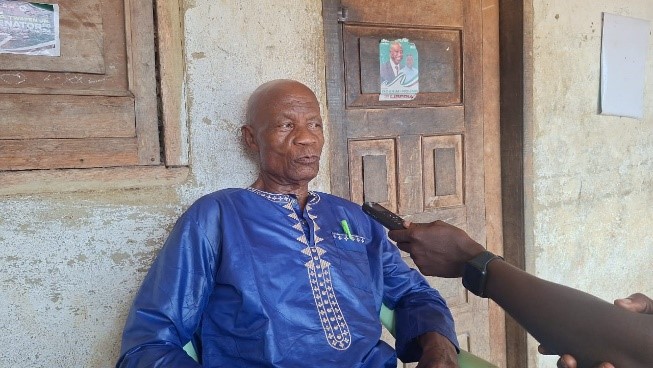Senator Bob Menendez, Chairman of the United States Senate Foreign Relations Committee, has written a compelling letter to outgoing U.S. Secretary of State Antony Blinken raising serious questions about one of High-Power Exploration (HPX)’s leading proposals to the Government of Liberia (GOL).
The letter casts a spotlight on HPX’s alleged $5 billion investment promise, which is yet to bear any fruit, and especially its contentious push for control of the Buchanan-Yekepa railway under the guise of funding a National Rail Authority.
In August 2024, HPX reports emerged that High Power Exploration (HPX) had proposed a $25 million deal to the Liberian government for the creation of a National Rail Authority, with the agreement expected to be finalized in Australia.
President Boakai later announced the establishment of a National Railway Authority after HPX’s years-long push and commitment to fund the establishment with the hope of accessing millions in funding from the implementation of the Countering People’s Republic of China Influence Fund (CPIF).
In his correspondence, Senator Menendez expressed concerns about the fund’s implementations, saying it falls short of Congressional intent, fails to adequately address the growing threat from China, and it suffers from a lack of strategic direction.
“In September, I blocked a CPIF project supporting the establishment of a National Railway Authority in Liberia.”
He said the SFRC oversight, including an on-site review in Liberia, revealed the project would not strengthen Liberia’s ability to compete with Chinese-supported mining operations in the country or the Chinese-backed railway in neighboring Guinea.
The Chinese are heavily supporting a railway project in Guinea, valued at an estimated $15 billion, to connect the country’s Simandou iron ore rich deposits to a deep-water port to enable export of one of the world’s largest untapped high-grade iron ore reserves.
This letter further excused US embassy staff taking advantage of the flexible rules of the CPIF to create a false connection or narrative against China (PRC, People’s Republic of China), and that they also used the initiative for purposes that were not originally intended or related to its actual goals.
Said Senator Menendez: “Embassy staff admitted to leveraging The CPIF’s broad guidelines to fabricate a counter-PRC nexus, and to repurposing the initiative to address unrelated objectives.”
He informed former Secretary of State Blinken that “Liberian officials later confirmed, in writing, that the intervention was unnecessary”.
In March 2022, High Power Exploration (HPX) paid the Liberian government $30 million as part of an amended Framework Agreement, which included an “UpFront” payment plan even though it had no legally banning agreement with Liberia. This payment was without legislative approval.
Former Finance Minister Samuel Tweah justified that the government accepted this payment due to challenges in raising civil servants’ salaries at the time.
However, concerns were raised about the transparency and legality of accepting such payments without legislative ratification, leading to suspicions of potential corruption and questions about the payment’s connection to the rejection of ArcelorMittal’s agreement.
HPX, under its leadership by billionaire mining magnate Robert Friedland, declared a multi-billion-dollar investment plan in Liberia. This announcement, widely publicized, was intended to solidify its position in the iron ore industry and promote its Simandou North project in Guinea. However, upon closer examination, several aspects of this investment plan remain unverified. Critics argue that HPX has failed to provide tangible evidence of its commitment, raising concerns of a potential “scam” to inflate public and political support.
The Buchanan-Yekepa railway, revitalized at a cost exceeding $800 million after Liberia’s civil war, has been at the heart of HPX’s lobbying efforts, which has aggressively promoted the idea of creating a “National Rail Authority” to manage the railway.
It committed $20 million to this concept, presenting it as a step towards shared infrastructure. However, insiders reveal that this push could pave the way for HPX to secure undue control over the railway, sidelining Liberia’s interests.
The 2021, ArcelorMittal Liberia (AML) proposed a new Mineral Development Agreement (MDA) which sought to expand AML’s iron ore production and enhance infrastructure investments.
However, HPX and others strongly objected to AML operatorship of the railway with heightened misinformation campaign to lawmakers and the public, which stalled the MDA’s ratification. HPX claimed that AML’s control of the railway was monopolistic, while conveniently omitting AML’s substantial investments in making the railway operational after years of wartime destruction. The stalling of the MDA has had ripple effects on Liberia’s economy, delaying critical projects and investor confidence.
The letter from Senator Menendez speaks to the need for due diligence in Liberia’s engagements with foreign investors and it serves as a cautionary tale for the Liberian government to avoid being swayed by grandiose promises without evidence. Liberia’s rich mineral resources and strategic infrastructure should be leveraged for national benefit, not as tools for manipulation by opportunistic entities.
While the idea of a National Rail Authority may appear appealing on the surface, it could lead to the dilution of Liberia’s sovereignty over critical infrastructure. HPX’s $20 million commitment to this initiative should be scrutinized. The government must ensure that the railway remains a national asset, benefiting Liberians rather than serving the interests of foreign corporations.
The U.S. senator’s intervention must signal a wake-up call for Liberia’s leaders to prioritize transparency, accountability, and national interests in their dealings with foreign investors.




